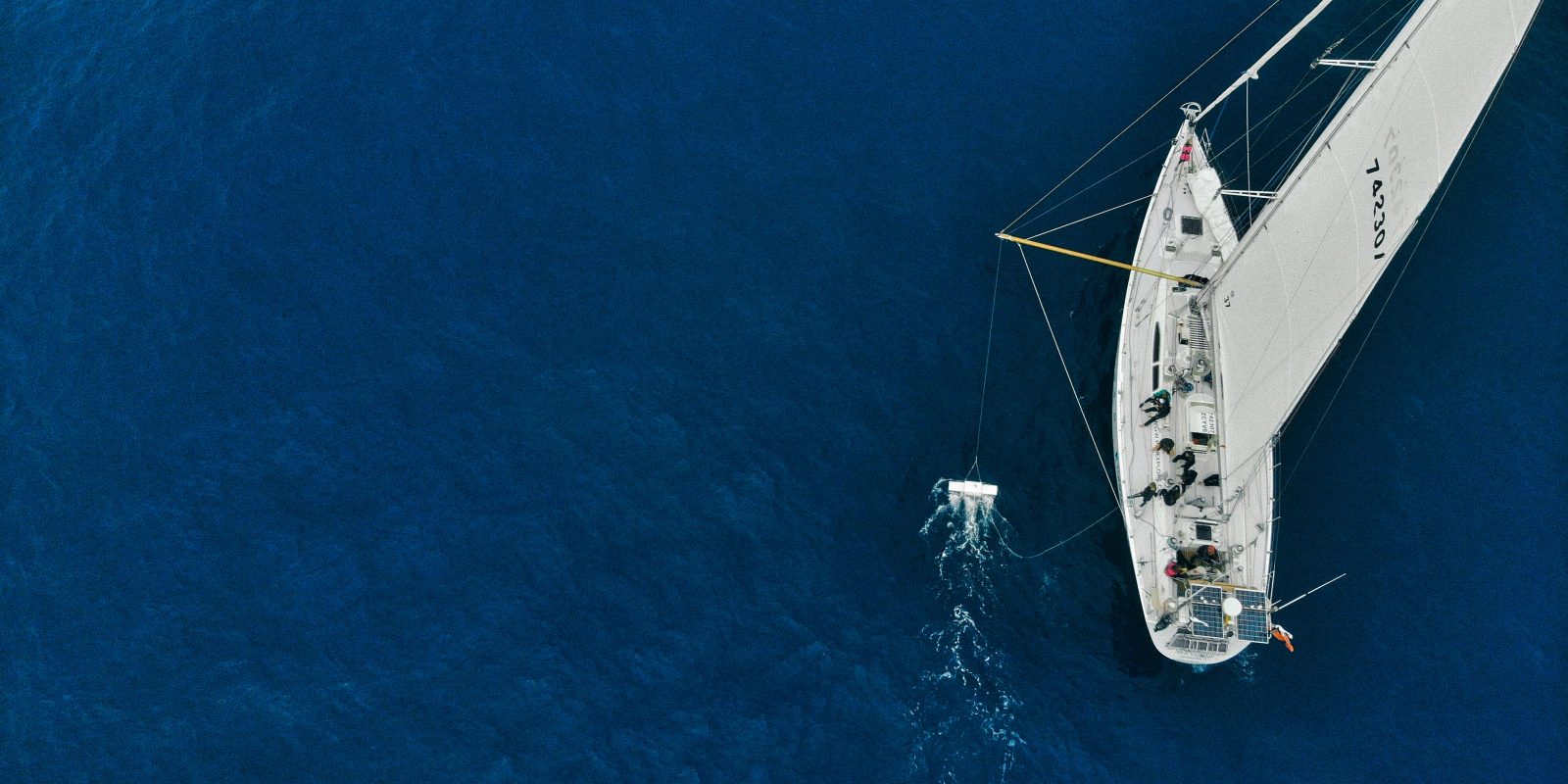Meet Lucy Gilliam, professional change maker, and co-founder of eXXpedition. With a degree in Biology, and PhD in Molecular Microbiology, her career has spanned academia, government, grassroots activism and supranational policy making. Currently, she works for Brussels-based NGO Seas At Risk, tackling climate impacts and pollution relating to the shipping sector.
She has sailed on three eXXpedition voyages and continues to support eXXpedition as a technical advisor and ambassador for the cause. We’ve been catching up with Lucy, about her recent projects and how they are enabling change.
When did you realise you wanted to be part of the solution for ocean plastic pollution?
It was whilst I was doing my biology degree at Exeter, specifically a module on ecotoxicology, lead me to volunteering in the Greenpeace laboratory. I learnt a lot from this time, particularly when helping to analyse seal and polar bear blubber to investigate organic pollutants, toxics and sediments. This experience began my journey to learn about the idea of environmental injustice in terms of chemical and toxic pollution around the world.
This led me to researching the Arctic. I learnt that indigenous communities living there had some of the highest body burden in the world; that mothers were passing on toxics while feeding their children, and that these were coming from industrial pollution generated by societies they weren’t part of, yet were still impacted by them. My interest in this unjust situation drove me towards my work in policy, beginning with my job at DEFRA.
It was around this time I met Emily! During a presentation in London, I remember her showing me these plastic fragments that had been found in fish, along with pictures of plastic pollution in the middle of nowhere. Given the overlap in our interests we decided to team up and begin the adventure that led to eXXpedition!
What happened next, after DEFRA?
I was at DEFRA around the time of the debate around the plastic bag charge to be introduced to supermarkets. However, despite the evidence, the science and the facts, policymakers still faced opposition from the media. The government was looking to make changes, but couldn’t because of the strong opposition. For the policy to come into effect, I observed how we needed the media and civil society onside. Facts and science alone were not cutting it, we needed storytelling. I realised then that there was a huge gap with positive storytelling about environmental change – which needed to be closed for environmental policy to be more successful, and eXXpedition was exactly that.
“I realised then that there was a huge gap with positive storytelling about environmental change”
We put ourselves out there, gathered scientific evidence and began to relay our experiences to others. Rather than being a scientist saying, “we’ve done this research and we’re gonna tell you what to do”, instead we created a message that said “we’ve looked at ourselves, this is what we found, this is how it affected us, and how it may affect you”. Telling stories and sharing experiences has greater power to make people care and take action. We set out to try and connect the threads between consumerism, the industrial processes, the environmental impact and most importantly, the consequences of exposure to chemicals and plastics and the long term implications on our health and the environment.

What’s your role at Seas At Risk?
I am involved in three main projects. I created ‘One Planet Shipping’, a system change project looking holistically at the future of the shipping industry: how trade volumes will change; the effect of environmental, social, and governance (ESG) goals; which parts of shipping will be profitable; and what that means for infrastructure and policy.
Secondly, I am working on a project called Ambition 2030, which sets ambitious climate goals for the industry for 2030, 2040, and 2050 to ensure the industry isn’t putting off the hard work. Instead we create robust targets to build reliable infrastructure, which is the insurance we need for the future. There’s a whole system that needs to shift and in order to do that, we need to have waymarkers, with clear reduction targets. We are really busy arguing for that with key players at the UN agency for shipping which is the International Maritime Organisation, but also in EU policy advocacy fora like the European Parliament and the European Commission.
Lastly, I am an EU technical adviser to the Clean Arctic Alliance, an alliance of 21 NGOs advocating for policy to prevent shipping pollution in the Arctic, such as banning heavy fuel oil and reducing black carbon emissions. Part of this work is also about connecting with indigenous communities, and supporting their voices amongst policy making circles.

“Policy makers need to ensure they are acknowledging that people from different places will all have different priorities and perspectives.”
What does successful policy making look like to you?
At Seas At Risk we are lucky to have a wide network with global reach, which is both exciting and key to successful policy making. Diversity of voices is crucial and having access to a global network gives you this. We’ve got lawyers, engineers, ecologists, scientists and many more. In every meeting or conference, I am always inspired by the variety of different people coming together to solve a problem. Policy makers need to ensure they are acknowledging that people from different places will all have different priorities and perspectives. Finding harmony between these differences is what makes for successful policy.

“Ultimately the economy needs to be rebalanced. We need to redesign the system for growth and efficiency, whilst also bringing resilience and equity.”
What’s next for the shipping industry? What would you like to see happen?
It’s important to use the renewable energy we have available. Wind propulsion, for example, is an energy source that is often left out of the decarbonisation conversation. Whilst it’s gaining traction, it needs to be given greater attention – the cheapest fuel for decarbonisation is the one that you don’t need!
Following on from an eXXpedition ethos, it’s also important to think about what we’re consuming and producing. Keeping ourselves accountable and asking ourselves: do we really need all of these things; could we reuse things instead? Should we be enabling a society that’s able to consume 37 kilos of clothes a year and throw most of them away within six months? We need to shift away from wasteful, hyper-consuming culture.
Though this may seem unrelated to the shipping industry, its growth and management correlates to demand. We need to cut that energy and material demand. Plastics and chemicals are classified as novel entities under the planetary boundaries framework. We’re already exceeding the safe planetary boundary for these materials into the environment.
Obviously, the story is different in different parts of the world. There are areas where the standard of living needs to improve which may mean more shipping to allow certain products and materials to get to their shores. Ultimately the economy needs to be rebalanced. We need to redesign the system for growth and efficiency, whilst also bringing resilience and equity.
“…the cheapest fuel for decarbonisation is the one that you don’t need!”
What are your plans moving forward?
Continuing to improve the shipping industry and understanding the relationship between shipping, trade and climate justice. I’ve also never been to the Arctic so that’s something I would love to do. Having done all the work I have there, I’m desperate to go experience it first hand and even hopefully see orcas in the wild!
“…the energy that comes from joining the dots for people, of giving them that “catalyst” lightbulb moment. That’s what I live for.”
What is it that keeps you kind of motivated and inspired to keep pushing for change and action?
Collaboration. And the energy that comes from joining the dots for people, of giving them that “catalyst” lightbulb moment. That’s what I live for. I’m all about dot joining and unearthing those moments for others. I think making connections between people or issues is my superpower!





